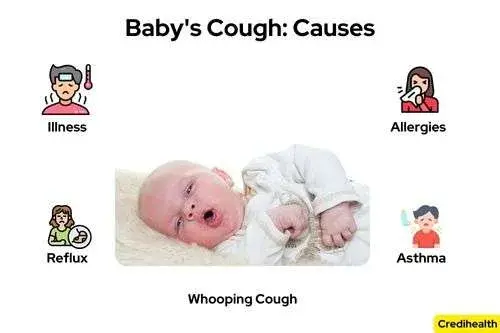If your child coughs and is sick, it will be difficult for you as a parent. In addition to being uncomfortable, your baby can struggle to relax and receive the sleep they require to feel well.
Due to their immature immune systems, babies are more vulnerable to viral illnesses like the common cold and cough.
Cough in infants can be a sign of a common cold or a more serious illness and should be monitored closely by a healthcare professional. Therefore, understanding the underlying condition may help you choose the most effective home treatment.
This article will examine the causes of infant cough and some remedies to treat the baby's cough, so continue reading to know more.
 Coughing a newborn might mean anything. It is typically a sign of a common cold. Generally speaking, we cough as a reflex when external irritants (bacteria, viruses, dust, dirt, or parasites) enter our throats.
We cough to open our airways and expel mucus (a typical, slick, and stringy fluid in the nose), phlegm (a thicker-than-normal mucus), or a stuck piece of food.
Cough in infants can be either dry (lack of mucous) or wet mucus.
Colds and allergies bring on dry coughs in infants. A bacteria infection that causes mucus production leads to a wet cough.
Occasionally, infants may experience asthmatic, whooping, or pneumonia-related baby coughs. Speaking with a pediatrician can better understand these kinds of infant coughs.
A wet or stuffed nose and a sore throat are signs of a newborn cough. Although baby coughs are typically dry, they can occasionally be accompanied by a very mild temperature. Either viruses or bacteria are to blame for infant coughs.
Also Read: Best immune booster for kids
Coughing a newborn might mean anything. It is typically a sign of a common cold. Generally speaking, we cough as a reflex when external irritants (bacteria, viruses, dust, dirt, or parasites) enter our throats.
We cough to open our airways and expel mucus (a typical, slick, and stringy fluid in the nose), phlegm (a thicker-than-normal mucus), or a stuck piece of food.
Cough in infants can be either dry (lack of mucous) or wet mucus.
Colds and allergies bring on dry coughs in infants. A bacteria infection that causes mucus production leads to a wet cough.
Occasionally, infants may experience asthmatic, whooping, or pneumonia-related baby coughs. Speaking with a pediatrician can better understand these kinds of infant coughs.
A wet or stuffed nose and a sore throat are signs of a newborn cough. Although baby coughs are typically dry, they can occasionally be accompanied by a very mild temperature. Either viruses or bacteria are to blame for infant coughs.
Also Read: Best immune booster for kids
 We cough when anything irritates your throat or lungs. The following are a few typical causes of coughing in infants.
We cough when anything irritates your throat or lungs. The following are a few typical causes of coughing in infants.
Why do infants cough?
 Coughing a newborn might mean anything. It is typically a sign of a common cold. Generally speaking, we cough as a reflex when external irritants (bacteria, viruses, dust, dirt, or parasites) enter our throats.
We cough to open our airways and expel mucus (a typical, slick, and stringy fluid in the nose), phlegm (a thicker-than-normal mucus), or a stuck piece of food.
Cough in infants can be either dry (lack of mucous) or wet mucus.
Colds and allergies bring on dry coughs in infants. A bacteria infection that causes mucus production leads to a wet cough.
Occasionally, infants may experience asthmatic, whooping, or pneumonia-related baby coughs. Speaking with a pediatrician can better understand these kinds of infant coughs.
A wet or stuffed nose and a sore throat are signs of a newborn cough. Although baby coughs are typically dry, they can occasionally be accompanied by a very mild temperature. Either viruses or bacteria are to blame for infant coughs.
Also Read: Best immune booster for kids
Coughing a newborn might mean anything. It is typically a sign of a common cold. Generally speaking, we cough as a reflex when external irritants (bacteria, viruses, dust, dirt, or parasites) enter our throats.
We cough to open our airways and expel mucus (a typical, slick, and stringy fluid in the nose), phlegm (a thicker-than-normal mucus), or a stuck piece of food.
Cough in infants can be either dry (lack of mucous) or wet mucus.
Colds and allergies bring on dry coughs in infants. A bacteria infection that causes mucus production leads to a wet cough.
Occasionally, infants may experience asthmatic, whooping, or pneumonia-related baby coughs. Speaking with a pediatrician can better understand these kinds of infant coughs.
A wet or stuffed nose and a sore throat are signs of a newborn cough. Although baby coughs are typically dry, they can occasionally be accompanied by a very mild temperature. Either viruses or bacteria are to blame for infant coughs.
Also Read: Best immune booster for kids
What are the Causes of Your Baby's Cough?
 We cough when anything irritates your throat or lungs. The following are a few typical causes of coughing in infants.
We cough when anything irritates your throat or lungs. The following are a few typical causes of coughing in infants.
1. Illness -
Babies may cough for various reasons, from bacterial diseases like bronchitis and pneumonia to respiratory viruses like the cold, flu, or croup. This is often brought on by increased mucus in the lungs or throat. However, it can also occur owing to irritated or inflamed bronchial tissue. Also Read: Is Bronchitis contagious?2. Allergies -
Typically, seasonal allergies don't appear in children until they are at least two years old, but your baby may be allergic to something else in their surroundings. Typical offenders include dust, mold, pet dander, and other household allergens.3. Reflux -
Gastroesophageal reflux disease (GERD), which can result in infant coughing, is common if the stomach acid irritates the throat.4. Whooping cough -
It is a dangerous bacterial disease that can strike both adults and infants. All children and adults around your baby should have received Tdap or DTap vaccinations. Your infant should have their first pertussis vaccination at two months old.5. Asthma -
Cough in infants can sometimes be due to asthma, a chronic condition that causes inflammation and narrowing of the airways, making it difficult for infants to breathe. Your infant may have asthma if they frequently cough at night as they try to fall asleep.Home Treatments for Cough in Infants -
It is crucial to see a pediatrician before giving newborns any drugs for colds and coughs. Typically, various home remedies can be used to treat infant coughs. Here are effective natural treatments for coughs in infants.1. Breast milk -
The best way to treat a baby's cough is to breastfeed them. Mother's milk has the fluid secreted by the mammary glands in a woman's breast. Breast milk shields infants from common illnesses like the common cold and cough due to the presence of healthy bacteria, antibodies, white blood cells, antimicrobials, immunoglobulins, proteins, enzymes, and hormones. Additionally, it increases the immune response to viruses, bacteria, and other pathogens.2. Giving fluids -
Keep your baby hydrated to help the baby flow up the mucous and cough up. Snot and other secretions from your baby may dry up and become difficult to cough if dehydrated. Experts advise maintaining the usual amounts rather than consuming additional fluids. For younger babies, maintain breast milk and formula. Water and unsweetened juices are acceptable fluids for older infants. Breastmilk or formula will be the only options for a very young infant, but babies six months or older can be given popsicles, broth, or even fruit with a high water content, like watermelon. The cough is sometimes persistent when the throat is dry, so that hydrating will help.3. Saline drops -
Putting OTC saline drops in the baby's nose is another technique to moisten secretions. Postnasal drip can be brought on by the baby's nasal mucus flowing down the mouth and back of the nose. It affects the throat and causes an upper airway (instead of the chest) rattling sound and a wet, barking cough. You might notice this cough more than usual after your baby wakes up. Throughout the day, apply two or three saline drops to each nostril. Your baby could sneeze or dislike the feeling of the drops entering their nose. So it is completely safe.4. Using Humidifier -
Coughing and stuffiness can be relieved by airborne moisture. Make use of a cool-mist humidifier to protect your child. Burns can result from steam and hot water in other variants. Additionally, it's crucial to clean it following the manufacturer's instructions and to change the water daily. This prevents germs and mold from forming inside.5. Try suction -
While it could irritate your baby's throat and airway, you may consider sucking the mucus out of their nose. Use a bulb syringe to force the air out after applying saline drops. It should point towards the back or side of the infant's nose when you enter it into their nostril while pressuring it in. Remove the syringe for cleaning after releasing the pressure to enable the mucus to be sucked out, then repeat on another side. Before storing it, ensure to clean it once more. Repeat as required throughout the day, but be aware that if you apply it too frequently, you risk irritating your baby's nose.6. Steam Bath -
It is advised to breathe in steam two to three times every day to treat cough in infants. Inhaling steam facilitates obstruction removal and mucus thinning in the baby's nose. The simplest method is to create a steam room in the bathroom by keeping the shower high while keeping the doors and windows closed. Sitting with the infant in this steamy area is enough to clear nasal congestion and cold symptoms. Book an online appointment with Nasal Congestion Doctors in India7. Clear out irritants -
Attempt to get rid of any allergies or asthma triggers in your house. Offenders might be things like dust, mold, cigarette smoke, and anything else that an allergy test for your baby finds triggers them. By irritating their nose and throat, it could exacerbate their cold. Infants who are exposed to secondhand smoke struggle more to recover from colds. They are also more prone to develop pneumonia or bronchitis. Avoid areas with cigarette smoke, and encourage guests not to smoke in your house. You may also read about Symptoms of Irritability.8. Encourage rest -
A strong immune system requires adequate sleep. It can aid in your baby's defense against the cold virus. Clear their congestion with saline drops and a syringe with a bulb before naps and before bedtime to assist them in getting a good night's sleep. Babies who are congested and coughing might become agitated and restless. Rest can aid infants in battling colds and coughing.Conclusion -
On average, babies catch up to eight colds every year. You don't need to worry because viral illnesses bring on most newborn coughs and will go away alone. Before the doctor's visit, trying these remedies like saline drops, using a humidifier, and addressing dust allergies will help the relief symptoms of cough in infants. Contact your doctor if the sound of your baby's cough worries you or if it has persisted for more than 10 to 14 days. Additionally, any symptoms of distress, including coughing, should always be treated urgently. Also Read: How to get rid of hiccups in newborns?
Reviewed by







